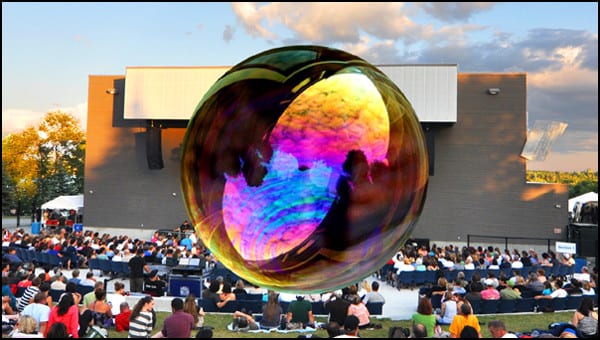
In the financial world, a "bubble" refers to a market or industry that is at its peak and about to decline. The Pacific Standard speculates that there is a bubble in the music festival industry. If that's true, can you see it ahead of time inside your festival ticketing software?
A “bubble” is defined by Wikipedia as “a situation in which asset prices appear to be based on implausible or inconsistent views about the future.”
Within the same Wikipedia definition, are past examples including the housing market circa 2006 and the roller coaster ride of gold prices. Some economists say that there is no such thing as a “bubble”, only the normal market forces of supply and demand, and the corresponding effects on prices. So, it may be more of a matter of subjective opinion whether or not a bubble exists in any given market or industry.
It is Sloat's opinion that the boost music festivals give to local area economies is contributing to “the bubble."
Napa’s BottleRock just enjoyed a successful premiere, and Monterey will be trying their luck this August with First City—although the California seaside town can already boast about its festival pedigree as home to the infamous Monterey Pop Festival, the first widely-promoted and -attended rock jubilee.
It would be easy to counter Ms. Sloat's opinion by saying the ever-increasing number of cities hosting music festivals is a healthy sign of growth. But then again, that’s what was said about home prices in 2005-2006. A previous post validates at least one of Sloat's points - the allure music festivals have for municipalities looking to increase revenue. The highly cited post details efforts made by cities to attract festivals by either underwriting some of the costs through grants and loans, or waiving lengthy permitting processes - or both - to benefit from the tremendous popularity of outdoor music events.
Host city incentives and underwriting do help festival operators get up and running quickly, giving some credibility to the Pacific Standard’s opinion that those incentives are fueling a bubble. However, there is evidence to the contrary....
In sharp contrast to the notion of music festivals being at a saturation point, and are unable to sustain any more growth, is the amazing story of the Sweetlife Music Festival.
Back in 2009, a group of hard-working entrepreneurs wanted a way to give back to the community in which their health food business operated. The first thing they thought of was music. Music’s universal appeal made it a natural foundation for saying “thank you."
The owners of Sweetgreen Foods began to say thank you to its community by renting a PA system and placing it in front of the store. Shoppers were greeted with their favorite music and the owners received so much positive feedback, they decided to take it to the next level with a music festival.
The first music festival produced by Sweetgreen Foods had an attendance of just 1,000 people and was held in the backyard of a Delaware home. Since then, the festival has seen a massive increase in attendance with the 2013 edition having sold 10,000+ tickets.
If a bubble did exist in the music festival industry, the offbeat example of Sweetgreen Foods should have not found such a wide-open market. It is difficult to make the case that a “dearth” of music festivals is diluting demand if a health food store festival sells out 10,000 tickets.
Ultimately, tit for tat speculation on whether or not a bubble exists in the music festival industry can be rendered moot by simply looking at the data. In other industries, like finance and housing, analysts rely on real-world numbers to gain insight into future market trends. This practice is directly applicable in music festivals as seen in the ticketing software.
A critical feature in leading festival ticketing software is the ability to examine sales data in great detail. Once ticket data is accumulated en masse, reports can be generated and the raw data can be exported into dedicated spreadsheet software like Microsoft Excel. Armed with the information, future demand can be accurately estimated. And if a so-called bubble is on the horizon, it will reveal itself in the sales data (aka “projections”).
Whether there is a bubble in the music festival industry, or if the Pacific Standard is acting like Chicken Little ("The sky is falling! The sky is falling!"), rest assured the clairvoyance a festival operator needs is inside the right festival ticketing software.
The ThunderTix plan for music festivals has robust sales data reporting tools that can assist you in spotting all types of market trends. Reports are critical to a festival operator's ability to gauge its success. As you sell tickets, the ThunderTix sales reports are available for you to customize and make use of to gain genuine insight to your business, your customer, and your sales agents.
You can generate the reports as frequently as you need them (daily, weekly, quarterly) and specify the types of sales data (single event, multiple events, by a sales agent, etc.) that best serve your business goals. Our technology supporting exporting your sales data to popular accounting and spreadsheet programs like Microsoft Excel.
Interested in learning how to use ThunderTix to gain market insight from your music festival's ticket sales? Please contact us at your convenience.